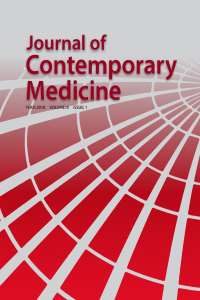ÜNİVERSİTE ÖĞRENCİLERİNİN MANEVİ YÖNELİMLERİ VE SAĞLIK ALGILARI
Maneviyat, Manevi Yönelim, Sağlık algısı, Üniversite, Öğrenci
SPİRİTUAL ORİENTATİON AND HEALTH PERCEPTİONS OF UNİVERSİTY STUDENTS
Spirituality, spiritual orientation, health perception, üniversity, Student,
___
- 1. Kaya M, Genç M, Kaya, B, Pehlivan E Tıp fakültesi ve sağlık yüksekokulu öğrencilerinde depresif belirti yaygınlığı, stresle başa çıkma tarzları ve etkileyen faktörler. Türk Psikiyatri Dergisi. 2007;18(2):137-146.
- 2. Chaves Ed C L, Iunes D H, Moura Cd C, Carvalho L C, Silva A M, Carvalho E. Anxiety and spirituality in university students: A cross-sectional study. Revista Brasileira de Enfermagem. 2015; 68(3): 504–509.
- 3. Sangelaji M H, Rassouli M, Farahani A S, Shaker N, Ilkhani M. Correlation between spiritual attitude and hope with quality of life in adolescents with chronic disease. Medical Ethics Journal. 2016;10(34): 143–163.
- 4. Salmani S, Biderafsh A, Arani ZA. The relationship between spiritual development and life satisfaction among students of Qom University of Medical Sciences. Journal of Religion and Health. 2019 (https://doi.org/10.1007/s10943-018-00749-8)
- 5. Deb S, MCgirr K, Sun J. Spirituality in Indian University students and its associations with socioeconomic status, religious background, social support, and mental health, J Relig Health. 2016; 55:1632-1641.
- 6. Kasapoğlu F. Manevi Yönelim Ölçeği’nin Geliştirilmesi: Geçerlik ve Güvenirlik Çalışması. İnönü Üniversitesi Eğitim Fakültesi Dergisi. 2015;16(3):51-68.
- 7. Puchalski C M, Blatt B, Kogan M, Butler A. Spirituality and health: The development of a feld. Academic Medicine. 2014;89(1), 10–16.
- 8. Jafari E, Dehshiri G R, Eskandari H, Najafi M, Heshmati,R, Hoseinifar J. Spiritual welbeing and mental health in university Students, Procedia Socia and Behavioral Sicences. 2010; 5:1477-1481.
- 9. Aghili M. Venkatesh Kumar G. Relationship between religious attitude and happiness among professional employees. Journal of the Indian Academy of Applied Psychology. 2008; 34: 66–69.
- 10. Adams T B, Bezner J R, Drabbs M E, Zambarano R J, Steinhardt M A. Conceptualization and measurement of the spiritual and psychological dimensions of wellness in a college population. Journal of American College Health. 2000; 48(4):165–173.
- 11. Kadıoğlu H, Yıldız A. Sağlık algısı ölçeği‟nin Türkçe çevriminin geçerlilik ve güvenilirliği. Turkiye Klinikleri. 2001; 32(1): 47-53.
- 12. Abbas S Q, Dein S. The Difficulties Assessing Spiritual Distress İn Palliative Care Patients: A Qualitative Study, Mental Health, Religion&Culture. 2011; 14(4): 341-352.
- 13. Lovanio K, Wallace M. Promoting Spiritual Knowledge and Attitudes, Holistic Nursing Practice. 2007;1:42-47.
- 14. Mert A, Topal İ. Benlik Ayrılaşmasının Manevi Yönelime Etkisinin Bazı Değişkenlerle İncelenmesi. Uluslararası Toplum Araştırmaları Dergisi. 2018; 8(14): 70-91.
- 15. Gürsu O, Ay Y. Din, Manevi İyi Oluş ve Yaşlılık. Uluslararası Sosyal Araştırmalar Dergisi. 2018; 11(61): 1176-1190.
- 16. Erişen M, Sivrikaya S K. Manevi Bakım ve Hemşirelik. Gümüşhane Üniversitesi Sağlık Bilimleri Dergisi. 2017; 6(3): 184-190.
- 17. Baker D C. Studies of İnner Life: The İmpact of Spirituality on Quality of Life, Quality of Life Research. 2003;12 (1): 51-72.
- 18. Boztilki M, Ardıç E. Maneviyat ve Sağlık. G.O.P. Taksim E.A.H. JAREN. 2017; 3 (Ek Sayı): 39-45.
- 19. Visser A, Garssen B, Vingerhoets,A. Spirituality And Well-Being İn Cancer Patients: A Review, Psycho-Oncology. 2010; 19, 565–572
- 20. Efteli E, Khorshtd L. İki Farklı Bölüm Öğrencilerinin Sağlık Algılarının Karşılaştırılması Ege Üniversitesi Hemşirelik Fakültesi Dergisi. 2016; 32(2):1-10.
- 21. Özdelikara A, Alkan S A, Mumcu N. Hemşirelik Öğrencilerinde Sağlık Algısı, Sağlık Anksiyetesi ve Etkileyen Faktörlerin Belirlenmesi. Bakırköy Tıp Dergisi. 2018; 14:275-282.
- 22. Alkan S A, Özdelikara A, Boğa N M. Hemşirelik Öğrencilerinin Sağlık Algılarının Belirlenmesi Gümüşhane Üniversitesi Sağlık Bilimleri Dergisi. 2017; 6(2):11-20.
- 23. Vissandjee B, Desmeules M, Cao Z, Abdool, S. Integrating Socio-Economic Determinants of Canadian Women's Health. BMC Women's Health. 2004; 4(1):34.
- 24. Fabricatore A N, Handal P J, Fenzel, L M. Personal spirituality as a moderator of the relationship between stressors and subjective well-being. Journal of Psychology and Theology. 2000; 28, 221–228.
- 25. Rew L, Wong Y J. A systematic review of associations among religiosity/spirituality andadolescent health attitudes and behaviors, Journal of Adolescent Health. 2006; 38:433-442
- 26. Nelm L W, Hutchins E, Hutchins D, Pursley R J. Spirituality and the Health of College Students, Journal of Religion and Health. 2007; 46(2): 249-265.
- 27. Anand V, Jones J, Gill P S. The Relationship Between Spirituality, Health and Life Satisfaction of Undergraduate Students in the UK: An Online Questionnaire Study. Journal of Religion and Health. 2015; 54,160-172.
- 28. Nagel, E., Sgoutas-Emch, S. The relationship between spirituality, health beliefs, and health behaviours in college students. Journal of Religion and Health. 2007; 46(1), 141–154.
- Yayın Aralığı: Yılda 6 Sayı
- Başlangıç: 2011
- Yayıncı: Rabia YILMAZ
Akciğer Kanseri Hastalarının Ölüm Risklerinin Zayıflık Modelleri ile Değerlendirilmesi
Özge PASİN, Şirin ÇETİN, İsa DEDE
İletişim Becerisi ve Empati Düzeyleri: Sağlık Bölümü Öğrencileri Örneği
Özgür ALPARSLAN, Ahmet ALPARSLAN
Çocuk Acil Servisine Zehirlenme Nedeniyle Başvuran Olguların Değerlendirilmesi
Ülkühan ÖZTOPRAK, Vesile ENERGİN
İlknur BOSTANCI, Rukiye ÜNSAL SAÇ, Dilek KAHVECİOĞLU, Serhat EMEKSİZ, Medine TAŞAR
Muhammet LİMON, Dilek TEZCAN, Semral GÜLCEMAL, Sema YİLMAZ, Çağrı TURAN
Zahide YALAKİ, Medine TAŞAR, Rukiye ÜNSAL SAÇ, Arife USLU GÖKÇEOĞLU, Filiz ŞİMŞEK ORHON
Günay EKBERLİ, Ufuk ATEŞ, Sümeyye SÖZDUYAR, Anar GURBANOV, Gülnur GÖLLÜ, Meltem KOLOĞLU, Aydın YAĞMURLU, Hüseyin DİNDAR, Ahmet ÇAKMAK
